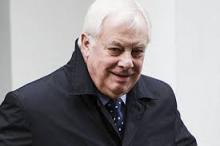Brexit Britain Confronts Reality
LONDON – Emma Duncan, one of Britain’s most respected journalists, recently wrote a commentary in The Times in which she reported on the experience of a Spanish friend who had visited the United Kingdom earlier this summer. Never mind the dire political situation in Britain, where there is currently little sign of anything resembling adequate government. Her friend encountered long airport queues, endless waits for luggage, crowded trains, miserable journeys, and dirty streets.
Ask Britons whether this sounds like an unfair exaggeration, and my guess is that most would say it matched their own recent experience – especially if they had waited for hours in our airports or ports to get away on holiday. In fact, many would recite a litany of other daily problems. With annual inflation at 10%, trade unions are up in arms and threatening strikes. The National Health Service is in increasing trouble. And soaring energy bills this winter will leave many families facing real hardship. Charities that work with the poor and deprived increasingly talk about people having to choose between eating and heating.
All this represents to some extent the accumulated political and economic detritus of years of bad governance. The COVID-19 pandemic, the war in Ukraine, and the inevitable consequences of an appallingly negotiated Brexit have added to Britain’s problems. On top of that, Prime Minister Boris Johnson was unfit for the office he has held, mendaciously peddling cheap British boosterism and appealing to prejudice instead of offering rational and competent policymaking.
True British patriotism – as opposed to Johnson’s shabby populism – should begin by forgetting about tabloid headlines and remembering that the country still does some things very well. Our active and committed charity sector involves millions of people in helping others less fortunate than themselves. We have some great universities and researchers leading the world in many areas. We have a formidable arts and culture sector. Our armed forces are widely respected for their professionalism (although they are less well-funded than they should be). And our legal system still works pretty well, despite attacks on its independence by some politicians and newspapers.
In general, however, Britain is a medium-size country with a declining international reputation. Our political institutions and political culture no longer command much respect. Our civil service has been hit hard by poor political leadership and attacks on its competence and integrity by those who are supposed to direct and inspire it. Our police are not held in the same esteem they once were.
Moreover, the economy, the success of which enables us to prosper and improve our public services, is struggling. Britain’s recent productivity record is pretty abysmal, and our northwest European neighbors have faster-growing per capita incomes and less unequal income distributions than we do.
This is the backdrop against which the relatively small number of Conservative Party members are currently choosing a new party leader, who will succeed Johnson as prime minister. The contest has pitched the remaining two candidates against each other in ways that seem to exemplify our national problems.
On one side, there is the foreign secretary, Liz Truss, for whom all but the most partisan Tory would struggle to count many successes during her lengthy cabinet career. Truss was formerly a strong advocate of Britain remaining in the European Union but is now regarded as the candidate favored by hardline Conservative Brexiteers, having tailored her appeal to the Tory right wing. She only occasionally concedes that the tax cuts she promises as the answer to soaring inflation would somehow need to be paid for.
Her opponent is the economically orthodox and intelligent former chancellor of the exchequer, Rishi Sunak, whose proposed policies appear more attuned to the imperative of tackling inflation and the hardship it is causing. But on the big issues of the past few years, Sunak has been wrong. He backed Brexit from the beginning, denies the damage it is doing, and enthusiastically supported Johnson’s bid for the premiership.
Which of these two can offer honesty to the British people, who deserve to be treated like grown-ups? To paraphrase the US Democratic politician Adlai Stevenson, the average man and woman are better than average.
Perhaps the opposition Labour Party and its leader, Keir Starmer, will soon shed their lasting identification with past left-wing nonsense and present a reasonable challenge to the right-wing Conservative government. But, for the moment, Britain’s political and economic prospects look grim. To say this is not to be unreasonably pessimistic, but simply to face facts.
Britons should not be in denial. We must look at ourselves calmly and honestly, recognizing the tough times that lie ahead and the changes needed to get the country back on track. Above all, as Johnson prepares to leave 10 Downing Street, there can be no going back to the belief that Britain can continue to have its cake and eat it in large slices.
Chris Patten, the last British governor of Hong Kong and a former EU commissioner for external affairs, is Chancellor of the University of Oxford and the author of The Hong Kong Diaries (Allen Lane, 2022).
© Project Syndicate 1995–2022
This article is brought to you by Project Syndicate that is a not for profit organization.
Project Syndicate brings original, engaging, and thought-provoking commentaries by esteemed leaders and thinkers from around the world to readers everywhere. By offering incisive perspectives on our changing world from those who are shaping its economics, politics, science, and culture, Project Syndicate has created an unrivalled venue for informed public debate. Please see: www.project-syndicate.org.
Should you want to support Project Syndicate you can do it by using the PayPal icon below. Your donation is paid to Project Syndicate in full after PayPal has deducted its transaction fee. Facts & Arts neither receives information about your donation nor a commission.

